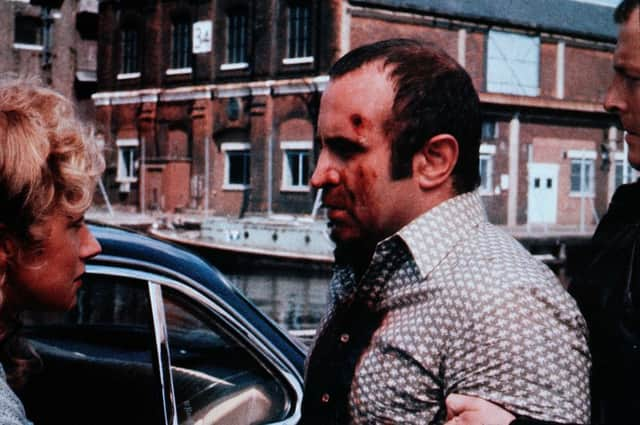Obituary: Barry Hanson, British film producer


Barry Hanson was the driving force behind The Long Good Friday, right, widely considered to be Britain’s greatest gangster film since Brighton Rock. It told the story of underworld boss Harold Shand planning to go into partnership with the New York Mafia to redevelop London’s Docklands but falling foul of the IRA.
As a producer who coaxed the best out of his directors, writers and cast, Hanson asked Barrie Keeffe – a journalist-turned-dramatist who drew on his experiences of reporting East End violence on the Stratford Express – what he wanted to write about. An American gangster film set in the East End of London was the answer and, given Hanson’s go-ahead, he produced a script in three days.
Advertisement
Hide AdAdvertisement
Hide AdThe result, giving Bob Hoskins his film breakthrough as the mobster in the mould of the Krays and Helen Mirren as his moll, Victoria, was not only a landmark movie but also, with its representation of ruthless capitalism and areas of London being transformed, a prophecy of 1980s “enterprise” values under the Thatcher government.
For several months before shooting began, Hanson sat down with Keeffe, Mackenzie and Hoskins every Sunday to develop the script. Mirren demanded rewrites to make her character more than the usual submissive gangster’s girlfriend to become the tough and shrewd power behind the throne.
The violence included rival gang bosses suspended upside down on meat hooks in an abattoir, Shand’s best friend stabbed in a swimming pool and stored in an ice-cream van, and a security guard nailed to the floor or a warehouse.
The Long Good Friday was originally made in 1979 for Lew Grade’s Black Lion Films, but the TV mogul’s insistence on lengthy cuts for reasons of violence and politics led Hanson – who called the edits “execrable” and leaving “nonsense” – to take it to HandMade Films, which bought it for £700,000, about £200,000 less than the production costs.
When it finally hit cinema screens in 1980, the movie was a hit at the box office and a firm critical success.
Hanson had begun work on it when he was a producer with t Thames Television, where he had previously produced another landmark production. The Naked Civil Servant (1975), Philip Mackie’s adaptation of Quentin Crisp’s autobiography, won a Prix Italia, as well as a Bafta Best Actor Award for John Hurt in the role of the flamboyant homosexual and Bafta’s Desmond Davis Award, recognising outstanding creative contribution, for director Jack Gold.
Barry Anthony Hanson was born in Bradford, West Yorkshire, the son of Harry, a seller of compost, and Irene (née Raistrick), a wool mill burler and mender. On leaving the city’s Bellevue Grammar School, he gained a degree in English from Newcastle University.
He taught at Bradford Grammar School for a year, before furthering his theatrical ambitions by becoming a publicist first at Harrogate Theatre in 1967, then a year later at London’s Royal Court Theatre.
Advertisement
Hide AdAdvertisement
Hide AdHanson soon moved to the production side at the Royal Court as assistant to artistic director Peter Gill. Hanson then became a fully fledged director himself.
He moved to Hull Arts Centre as its artistic director in 1969 then directed Waiting for Godot at Edinburgh’s Royal Lyceum Theatre (1971).
In 1971 he switched to television to work as script editor alongside David Rose, head of the BBC’s newly formed English regions drama department, at Pebble Mill, Birmingham.
Their brief was to contribute to the long-running series Play for Today, as well as Thirty-Minute Theatre (1972-3), commissioning writers who lived in or had a particular concern for the regions, including Alan Plater, Arthur Hopcraft, John Hopkins and Jack Rosenthal,.
By the time the department was producing Second City Firsts (1973-4), Hanson was a producer making plays for it such as Match of the Day (1974), Neville Smith’s soccer drama directed by Stephen Frears. He also produced Philip Martin’s Play for Today Gangsters (1975), about the Birmingham underworld.
At Thames Television, he was producer of Plays for Britain (1976) and two series (1977-8) of ITV Playhouse.
Hanson had particular success at Thames with writer Trevor Preston’s hard-hitting series Out (1978), starring Tom Bell as Frank Ross, a convicted bank robber released from jail and seeking revenge on the informer who put him away.
For Black Lion Films, he then produced the 1979 TV movie Bloody Kids, a disturbing drama about youth alienation in an Essex seaside town, written by Poliakoff and directed by Frears.
Advertisement
Hide AdAdvertisement
Hide AdShort excursions into films saw him produce Runners (1983), Poliakoff’s story about a father’s search for his missing daughter, and Morons from Outer Space (1985).
Most of Hanson’s later work was in television. He ran his own production company, Telekation International, making shows such as The Wine Programme (1983-7) and The Victorian House (1987) for Channel 4, then returned to BBC Pebble Mill in 1991 as head of English regions drama, responsible for A Year in Provence and director Ken Russell’s Lady Chatterley (both 1993).
In 1996, he retired but briefly returned to work as co-producer of the horror film Creep (2004).
Hanson’s 1971 marriage to Susanna Capon ended in divorce in 2012. He is survived by their daughter, Katy.